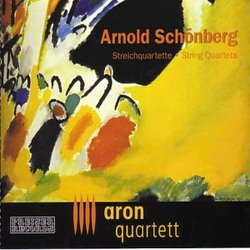| All Artists: Arnold Schoenberg, Spoken Word, Recorded Sound, Anna Maria Pammer Title: Arnold Schönberg: String Quartets Members Wishing: 0 Total Copies: 0 Label: Preiser Records Release Date: 4/27/2004 Genres: Special Interest, Classical Styles: Chamber Music, Historical Periods, Classical (c.1770-1830), Modern, 20th, & 21st Century Number of Discs: 3 SwapaCD Credits: 3 UPC: 717281905725 |
Search - Arnold Schoenberg, Spoken Word, Recorded Sound :: Arnold Schönberg: String Quartets
 | Arnold Schoenberg, Spoken Word, Recorded Sound Arnold Schönberg: String Quartets Genres: Special Interest, Classical |
Larger Image |
CD Details |
CD ReviewsThe Essence of Schönberg... Sébastien Melmoth | Hôtel d'Alsace, PARIS | 03/22/2009 (5 out of 5 stars) "The Essence of Schönberg...
. It's reported that Goethe has characterised the form of the string quartet as "a conversation among equals"--which, considering how difficult it would be to get four true "equals" in one room together, is an arresting concept. To paraphrase another scholar, "The string quartet is prëeminently the dialectical form suited to logical intercourse in the inquiry of truth. With nothing to spare for `padding,' the closely related characters of the four instruments lend no indulgence as with the symphony." In this line J.W.N. Sullivan says, "The string quartet is the most sincere form, as the opera is the least." . With these formal ideas in mind while reviewing Schönberg's oeuvre, what may we conclude? ~ That his magnum opus (Moses und Aron) is cast in the least sincere form--the opera? ~ That his greatest purely instrumental work (Variations for orchestra, Op. 31) is cast in the most massive and least subtle form--the symphonic? ~ That his most essentially characteristic music--that which spans his entire career and is cast in the most sincere form--is his canon of five string quartets? A reasonable argument could be made for this final proposition, and it is indeed presented most lucidly in this issue of Schönberg's complete string quartets by the Aron Quartet of Vienna. . Schönberg's quartets perfectly correspond with the trajectory of his aesthetic periodization: No. 0 (1897) = Early Period (late-Romantic); No. 1 (1905) = First Period (Jugendstil [Art Nouveau]); No. 2 (1908) = Second Period (Expressionistic); No. 3 (1927) = Third Period (Dodecaphonic); No. 4 (1936) = Late Period (Synthetic). This set also includes two substantial Quartettsätzen: the C-major Presto (c.1894) and the F-major Scherzo (1897). The Aron's readings here are closer to the LaSalle's frenzied razor-slashing stiletto-stabbing rampage than to the Leipziger's cool invective, though there is less headlong rush in this subtle episodic phraseology than in the apocalyptic Dies Irae style of the LaSalle. While Schönberg's characteristic grimacing satisfaction of understanding cannot evade expression, the Aron's readings here may be most approachable for their sheen of surface pulchritude. And the tempi are quite excellent. . From the critique of a soul of great spiritual integrity, much of Schönberg's art expresses cosmic indignation at the temerity of transgression. ("Transgression" indicating both physical violence and monomaniacal egotism, neither of which respect human dignity nor personal autonomy: we don't have to look to Lucifer's vanity for a source of evil, but simply observe mankind's inhumanity to man as the terrestrial manifestation of it.) Betimes in his art, Schönberg condemns sin with the trenchant virulent judgemental wrath of a minor prophet--(Habakkuk or Zephaniah, by choice). But ultimately--(aside from Schönberg's philosophical ethos)--this is music of great beauty in the form of melody, harmony, rhythm, and timbre. The same may be said of Beethoven's late quartets: they offer deeply philosophical content which may or not necessarily be considered apart from their sheer physical (acoustical) musical beauty. This set of Schönberg's five string quartets is the bookend to Beethoven's late quartets: for in height and depth and all philosophical considerations, and in genius of artistic technical expression, Schönberg is Beethoven's direct heir--indeed, his own true son. ." |
